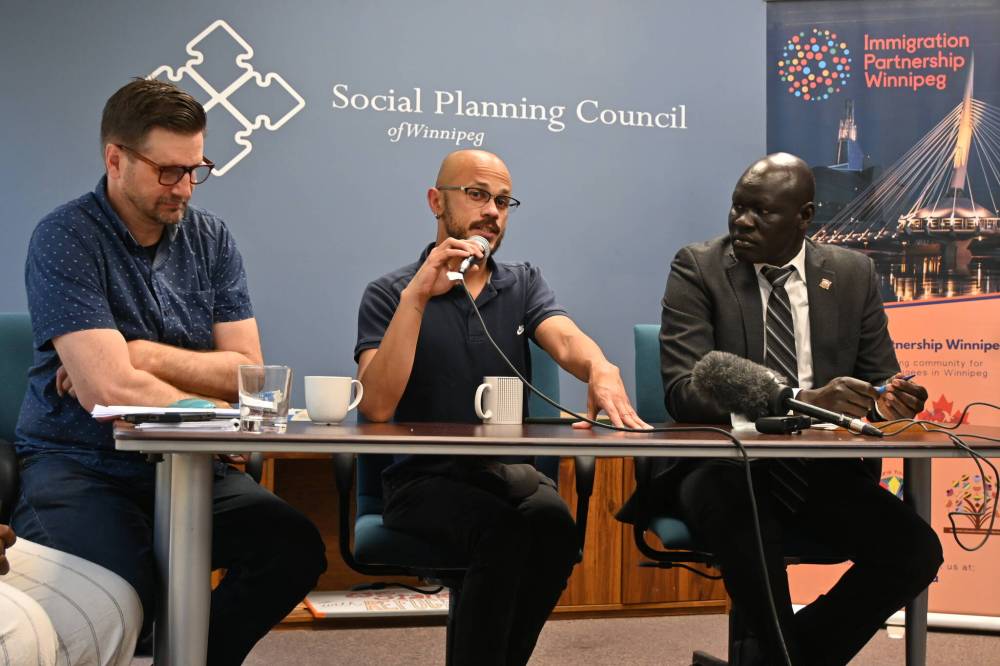Immigrants want change to policing in Winnipeg
Advertisement
Read this article for free:
or
Already have an account? Log in here »
We need your support!
Local journalism needs your support!
As we navigate through unprecedented times, our journalists are working harder than ever to bring you the latest local updates to keep you safe and informed.
Now, more than ever, we need your support.
Starting at $15.99 plus taxes every four weeks you can access your Brandon Sun online and full access to all content as it appears on our website.
Subscribe Nowor call circulation directly at (204) 727-0527.
Your pledge helps to ensure we provide the news that matters most to your community!
To continue reading, please subscribe:
Add Brandon Sun access to your Winnipeg Free Press subscription for only
$1 for the first 4 weeks*
*$1 will be added to your next bill. After your 4 weeks access is complete your rate will increase by $4.99 a X percent off the regular rate.
Read unlimited articles for free today:
or
Already have an account? Log in here »
Winnipeg — Members of Winnipeg’s immigrant community are frustrated with the lack of action in addressing safety concerns — such as police racial profiling — and want more culturally relevant justice systems, researchers said at an event Saturday.
Immigration Partnership Winnipeg, a non-profit that helps connect newcomers and refugees with community resources, hosted a panel Saturday with three researchers who spent the last five years interviewing people from multiple newcomer communities in the city — Sudanese, Nepali, Filipino, Afghan, Chinese, Ukrainian, Colombian, Southeast Asian, African, and others — about their experiences.
Their report, funded by the Winnipeg Foundation and Immigration Partnership Winnipeg, will be released next week.

Researchers Matt Fast (from left), Darrien Morton and David Mabior Atem share their findings on newcomers’ safety concerns during a Saturday event in downtown Winnipeg. (Matthew Frank/Winnipeg Free Press)
“(Community) leaders were saying, ‘We don’t feel comfortable actually saying to the community to trust the police,’ because things just keep on escalating and things are getting worse,” said Darrien Morton, a PhD student from the University of Manitoba and one of the lead researchers.
“Safety sometimes moves into the background, even for the young people (who) have experienced police violence and experienced racial profiling. For them, even this just becomes a way of daily life.”
David Mabior Atem, another researcher at the event, said over-policing is a major issue affecting immigrant communities.
“They don’t police people because of what you do. Most of the policing is because of how you look,” he said. “Most of the youth from racialized communities have said this across the board that they are being targeted.”
Matthew, an attendee at the meeting, told the audience he dresses in expensive-looking business clothing so police won’t racially profile him.
“The reason I dress up like this is so then I don’t die. It’s so then I don’t get reduced my skin colour,” he said.
“When I’m dressed up like this, I’m seen more responsible and professional. But when I dress in my track suit, I’m another thug.”
Atem said one possible solution would be to include immigrant communities in restorative justice strategies. For example, police could involve community leadership in responses to non-criminal calls to provide cultural context.
“Some of the things that go to court, that can be done by the communities because that’s how they used to resolve their problem back home. People sit and talk and address it at a community level,” he said.
Attendees discussed the fatal police shooting of 19-year-old Afolabi Stephen Opaso in 2023. Police responding to a mental-health call about Opaso, a Nigerian student studying economics at the University of Manitoba, found him wielding two knives, police said at the time. Officers told him to drop the knife three times before firing three shots, according to an audio recording previously reviewed by the Free Press.
Reuben Garang, director of Immigration Partnership Winnipeg, said having people at the scene who were knowledgeable about the Opaso’s cultural background might have helped de-escalate the situation.
“When people are experiencing a mental health episode, and interacting with the police, there’s fear on both sides. But if there are cultural groups that are involved in this, they also come with different understanding,” he said.
Garang said he has de-escalated similar situations. In one case, he said a man who had mental health issues was surrounded by police. He approached the police officers and asked if he could talk with the man and managed to defuse the crisis.
“Imagine if I had not intervened in that situation. It could’ve ended in that person being killed,” he said.
» Winnipeg Free Press
Morton said community members feel reports are repeatedly released with recommendations for change, but result in no action and make little difference. But Garang is optimistic the forthcoming report will help generate a conversation with police and other communities so positive change can happen.
» Winnipeg Free Press
